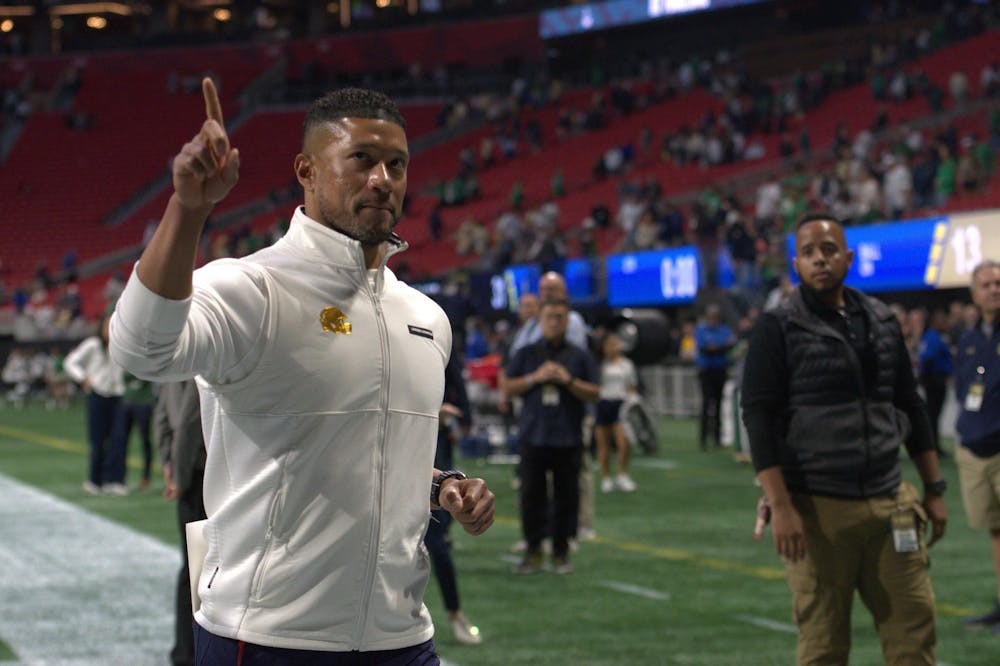My good friend J.J. Post, a former associate sports editor here at The Observer, has a famous line that seems to ring true time and time again during football season. Consisting of five simple words, you’d better believe I heard a lot on Saturday as Notre Dame finished off Georgia Tech in Atlanta.
Special teams make special teams.
Now you’re probably thinking, “How in the world can a football team’s aspect that shows itself only 20 to 30 times per game really impact a team’s chances of winning that game?” You’re right to ask that question. Statistically speaking, you’ll almost never see a special teams play or performance single-handedly change the outcome of a game. But there’s something about a big special teams play that has a profound influence on momentum and overall vibes — whether you want to try and quantify those or not.
Special teams plays are inherently boring. Most kickoffs go through the end zone for a touchback. Punts typically result in a fair catch or a short return. Field-goal and extra-point attempts either split the uprights or don’t. That’s why kickoff return touchdowns, blocked punts and fake field goals create such a thrill. The play no longer has a near-binary outcome, and the result is often jarring.
Think back to the end of the 2022 Notre Dame football season. About halfway through the year, as the team was emerging from the depths of 3-3, then-special teams coach Brian Mason cooked up one of the fiercest punt-blocking units you’ll see. At one point in early November, the Irish had batted down five punts in a four-game stretch. They opened the scoring in their blowout of No. 4 Clemson by blocking a punt and returning it for a touchdown. The scope of the blocking frenzy grew so large that Irish fans were ready to erupt every time the opposing punter took the field.
So how does all of that relate to Saturday’s 31-13 Notre Dame defeat of Georgia Tech? You see, the Irish went hog wild on special teams in the second half. Late in the third quarter, freshman defensive end Bryce Young blocked a field goal to keep Notre Dame up 21-7. A few drives later, the Irish successfully faked a punt by feeding sophomore running back Jeremiyah Love on a double reverse. Up 17 points with four minutes, they converted on a fake field goal by having senior wide receiver Tyler Buchner act as the holder and take off with the football.
Hitting the jackpot on special teams the way that Notre Dame did meant a pretty significant departure from the 2024 Irish norm. At the season’s midway point, Notre Dame had faced a lot of question marks relating to special teams. The Irish had two of their field-goal attempts, including a potential game-winner, blocked in the two-point loss to Northern Illinois on Sept. 7. Later in September, the Irish fumbled first-quarter kicks against Miami (Ohio) and Louisville. Graduate Aussie punter James Rendell wasn’t hitting the desired distances on his boots. Graduate kicker Mitch Jeter had been good but went down with an injury two Saturdays ago against Stanford and hasn’t played since.
All the while, Notre Dame hadn’t yet found the type of special teams play that can change a game. There was no return touchdown like those of Chris Tyree and Jadarian Price in years prior. No tone-setting block like the one that set the 2022 Clemson upset in motion.
Saturday’s three special teams plays didn’t exert much influence on the game’s outcome, but they showed something we haven’t seen yet from this year’s Irish team: complete control of the third phase. That’s a very important asset for this group to carry with it. Notre Dame has become notorious for starting slow on both sides of the football this year. Just imagine the way a successful fake punt or lengthy kickoff return could jumpstart the Irish in a time of need. To get where they want to go, the Irish just need to win games. Turning the tides in a close contest often starts with doing the little things, which special teams so closely embody, better than the opponent.
The college football hierarchy has opened up more and more with each passing week. Only Oregon, Penn State, Miami (Florida), Iowa State and BYU — none of which have looked particularly dominant — remain undefeated and ranked ahead of the Irish. The path is there for Notre Dame to turn a 1-1 start into a special season.
Special seasons require special teams. And special teams make special teams.










